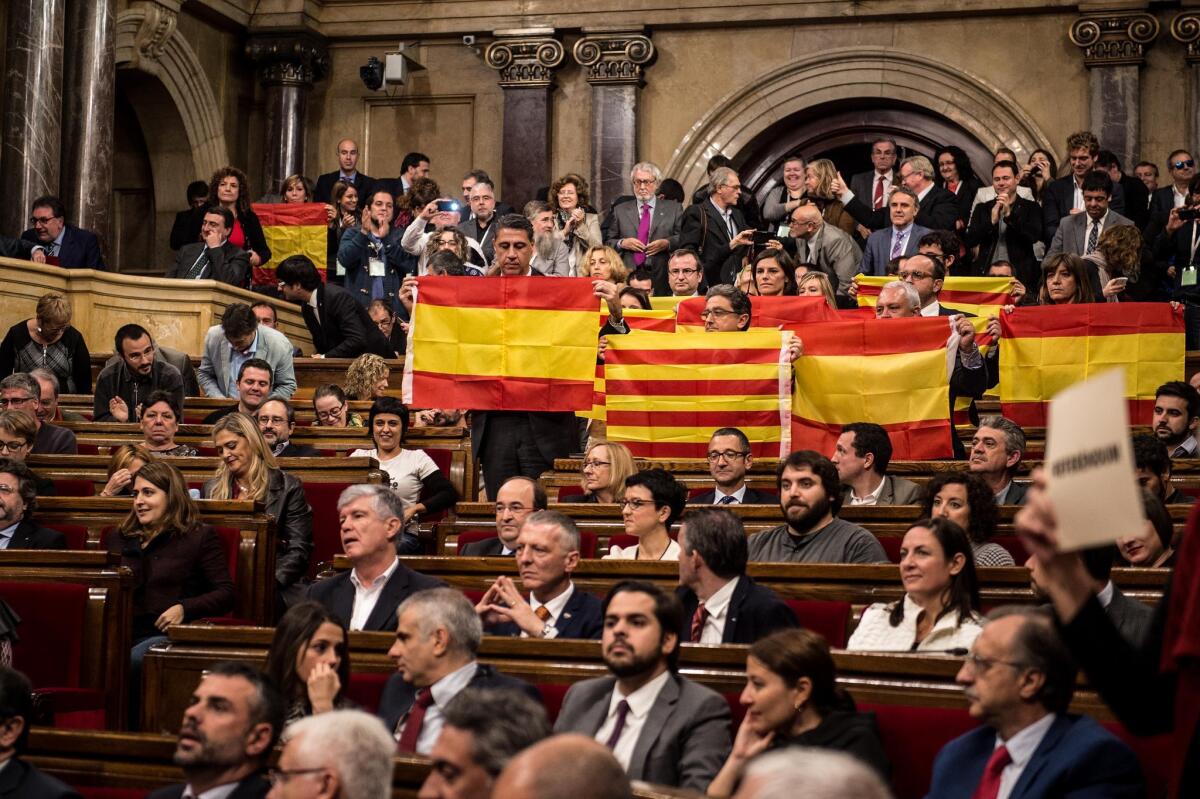Lawmakers in Catalonia vote to ‘disconnect’ from Spain over next 18 months

Spanish and Catalan flags are held up at the end of the Catalan parliamentary session Monday in Barcelona, Spain. The regional parliament passed a motion declaring the start of an 18-month process to break away from Spain.
- Share via
Reporting from Madrid — Lawmakers in Spain’s northeast region of Catalonia voted Monday to “disconnect” from Spain by 2017 and transform the economically powerful tourist hub into Europe’s newest independent nation.
Voting 72-to-63, members of the Catalan regional parliament in Barcelona endorsed an 18-month road map toward secession from Spain. The declaration called for immediate “disobedience” to Spain’s “delegitimized” Constitutional Court and said Catalonia should not be bound by future Spanish laws or institutions.
Shouts of “Independence!” rang out in the chamber after the vote, followed by rival chants of “Long live Spain!” from unionist members of parliament.
Prime Minister Mariano Rajoy urged Spaniards to “stay calm” and vowed to lodge an immediate appeal to the Constitutional Court to declare the Catalan motion unconstitutional. Last week, the court refused a request to block debate in the Catalan parliament over the motion.
“The government will not allow this to continue,” the Spanish leader told reporters while on a holiday trip to the mountain hamlet of Bejar, west of Madrid. “Nobody can give themselves unlimited powers outside of democracy.”
Spain’s constitution says the country’s unity is “indivisible,” and Madrid considers any regional secession illegal.
Pedro Sanchez, the leader of the opposition Socialist party, said Catalan leaders aimed “to steal Spanish citizenship” from their people. In recent weeks, Rajoy has met with the leaders of Spain’s three other main political parties to establish a united front against Catalan separatists ahead of closely contested nationwide elections Dec. 20.
The Spanish government was not in session Monday because of a regional holiday celebrating Madrid’s patron saint. An emergency Cabinet meeting will be held Tuesday, Rajoy said.
Monday was the one-year anniversary of an independence referendum in Catalonia that was declared illegal by Madrid. Voters overwhelmingly endorsed independence in that poll, but turnout was low after Spanish officials said its results would be invalid. Recent opinion polls show Catalans are evenly divided on whether to break away from Spain.
The 18-month road map calls for the passage, within 30 days, of laws setting up a new Catalan tax authority and social security system, as well as the drafting of a Catalan constitution. Residents and businesses in the region currently pay taxes to the central government in Madrid.
It would be relatively easy for Catalonia to begin deducting taxes from salaries of its local public-sector employees, analysts say. But it must also persuade private businesses and multinational companies with offices anywhere in Catalonia to pay their taxes to a new Catalan entity instead. Spain could prosecute them for tax evasion.
Catalonia, with 7.5 million residents, has an economy roughly the size of Portugal’s, making up one-fifth of Spain’s gross domestic product. It is also the country’s biggest tourist hub, with Barcelona as its capital, and has its own language and culture.
Oppressed under the nearly 40-year dictatorship of Gen. Francisco Franco, which ended with his 1975 death, Catalans have long sought autonomy from Madrid. The recent economic recession left many Catalans resenting the amount of taxes they pay to Madrid to subsidize poorer Spanish regions.
Monday’s declaration was introduced by an alliance of pro-independence lawmakers called “Together for Yes” and the left-wing Popular Unity Candidacy. The two independence-minded groups won a majority in Catalonia’s parliament in regional elections in September. But formation of a Catalan government has been delayed amid a dispute over who should be its president.
Popular Unity Candidacy opposes the current leader, Artur Mas. He was scheduled to face a no-confidence vote in Catalonia’s parliament this week. The region could face fresh elections if a government is not formed by Jan. 9.
Frayer is a special correspondent.
More to Read
Sign up for Essential California
The most important California stories and recommendations in your inbox every morning.
You may occasionally receive promotional content from the Los Angeles Times.










